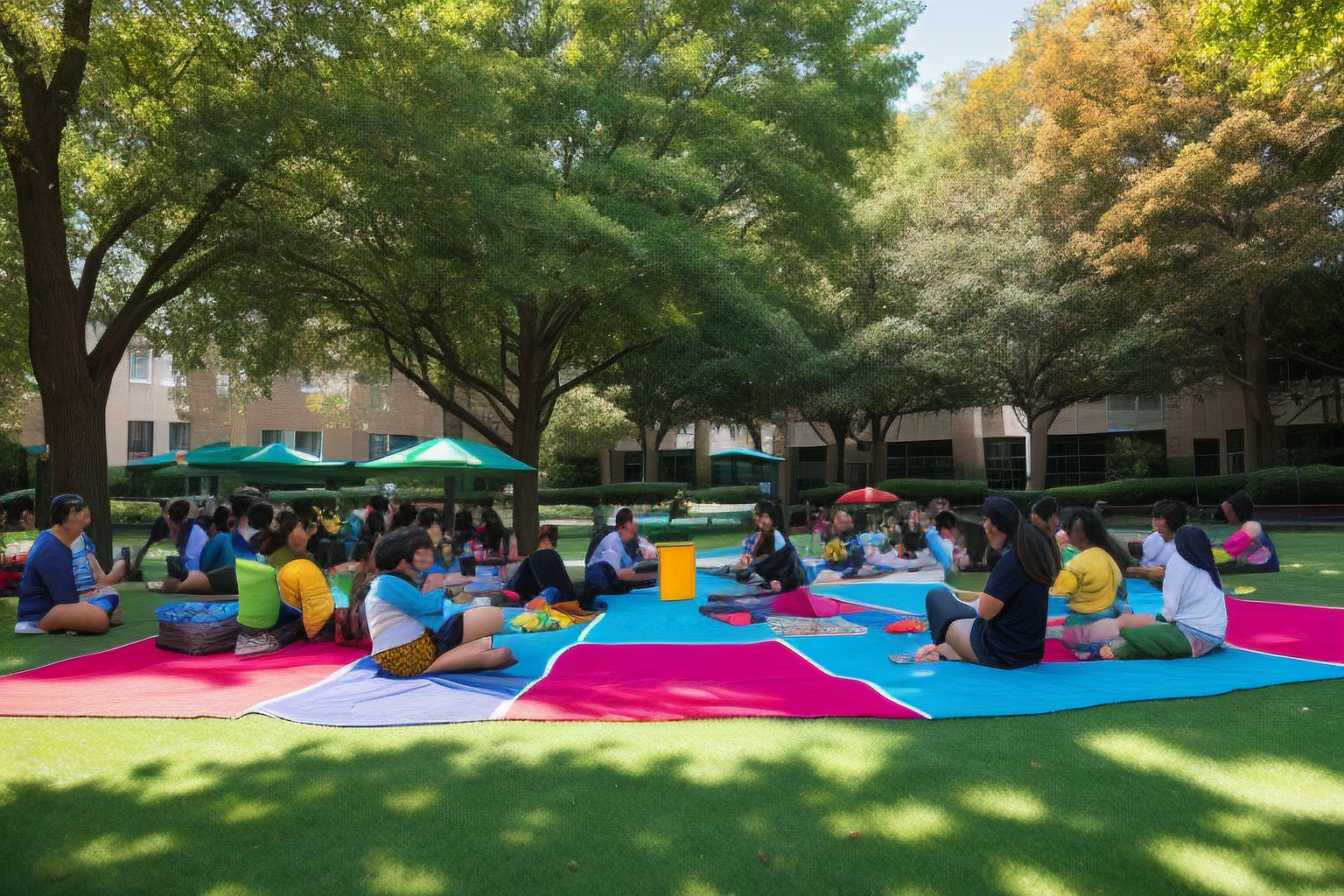Starting university can feel like stepping into a whole new world. With so many people around, it’s easy to feel overwhelmed and isolated. But here’s the good news: making friends doesn’t have to be a daunting task! In fact, there are some unexpected ways to forge connections that can lead to lasting friendships. Imagine walking into a room full of strangers and leaving with a group of friends who share your interests and passions. Sounds amazing, right?
First off, embracing your campus culture is crucial. Every university has its own vibe, and understanding this can help you navigate social situations more easily. Are there any quirky traditions or popular hangout spots? Jumping into these aspects can provide a natural conversation starter with fellow students.
Moreover, don’t underestimate the power of extracurricular activities. Joining clubs or societies that resonate with your passions can help you meet like-minded individuals. Whether it’s a sports team, a book club, or an art society, these groups create a relaxed environment for you to connect with others. Remember, everyone is there for the same reason: to meet new people and have fun!
So, are you ready to step out of your comfort zone? By being open and engaging, you’ll find that friendships can blossom in the most unexpected places!
Table of Contents
Understanding Campus Culture
Campus culture is like the vibrant tapestry of life at university, woven together by the diverse threads of student backgrounds, interests, and experiences. It plays a crucial role in shaping social interactions, and understanding its nuances can significantly enhance your ability to connect with others. Think of it as a dance; knowing the rhythm and steps can help you join in seamlessly. From the moment you step onto campus, you’ll notice various social dynamics at play, influenced by everything from traditions to the local environment.
To truly thrive in this setting, it’s essential to observe and adapt to the unwritten rules that govern social behaviour. For instance, some campuses might have a laid-back vibe, while others could be buzzing with high-energy events. Recognising these differences can help you navigate the social landscape more effectively. Here are a few key aspects of campus culture to keep in mind:
- Traditions: Each university has its unique customs that foster a sense of belonging.
- Inclusivity: Look for opportunities to engage with diverse groups to broaden your perspective.
- Events: Attend campus events to immerse yourself in the culture and meet new people.
By understanding and embracing the campus culture, you’ll find that forming meaningful friendships becomes a natural and enjoyable experience. So, don’t hesitate to dive in and explore the rich social fabric that awaits you!
Engaging in Extracurricular Activities
Extracurricular activities are the heartbeat of campus life, offering a vibrant tapestry of opportunities to forge friendships. Imagine walking into a room filled with people who share your interests; it’s like finding a hidden treasure in a vast ocean! Engaging in these activities not only broadens your horizons but also allows you to connect with others in a relaxed environment. Whether you’re into sports, arts, or academic clubs, there’s something for everyone.
Participating in clubs and organisations can feel like joining a family. You’ll find that these groups often have a shared passion, making it easier to strike up conversations and build rapport. For instance, if you’re a fan of photography, joining a photography club can lead to collaborations that spark creativity and friendship. Here’s a quick look at some common types of clubs:
- Sports Teams: Great for fitness enthusiasts and team players.
- Academic Societies: Perfect for those looking to deepen their knowledge.
- Arts and Culture Groups: Ideal for creative souls wanting to express themselves.
- Volunteer Organisations: Excellent for those who wish to give back to the community.
So, how do you find the right club for you? Start by exploring the activities fair at the beginning of the semester. Talk to current members, attend a few meetings, and don’t hesitate to try out different clubs until you find your niche. Remember, every new connection can lead to unexpected friendships that enrich your campus experience!
Finding the Right Club for You
Choosing the right club on campus can feel like searching for a needle in a haystack, but it doesn’t have to be that daunting! Start by reflecting on your passions and hobbies. Are you a sports enthusiast, a budding artist, or perhaps a tech whiz? Identifying what excites you can significantly narrow down your options. Many universities offer a plethora of clubs, ranging from sports teams to cultural organisations, and even academic societies. By attending club fairs or browsing your university’s website, you can gather a wealth of information about what’s available.
Once you’ve shortlisted a few clubs, don’t hesitate to attend a couple of meetings or events. This is your chance to experience the atmosphere and see if it resonates with you. Remember, the goal is to find a space where you feel comfortable and excited to contribute. Engaging with current members can provide valuable insights into the club’s dynamics and help you gauge whether it aligns with your personality.
Ultimately, the right club for you is one that not only fuels your interests but also fosters connections with like-minded individuals. So, take a leap of faith, step out of your comfort zone, and embrace the adventure of discovering your perfect fit!
Benefits of Joining a Club
Joining a club on campus is like unlocking a treasure chest of opportunities that can significantly enhance your university experience. Firstly, it provides a sense of belonging, which is crucial when you’re navigating the often overwhelming world of college life. Imagine stepping into a room filled with people who share your interests; it’s like instantly finding your tribe!
Moreover, clubs offer a fantastic platform for personal growth. Engaging in activities that challenge you can boost your confidence and help you develop new skills. Whether it’s honing your leadership abilities or learning to work as part of a team, the benefits are endless. For instance, consider the following:
- Networking Opportunities: Clubs often host events that connect you with professionals in your field.
- Social Skills Enhancement: Regular interactions with diverse groups help you become more socially adept.
- Fun and Enjoyment: Let’s face it, being part of a club is simply fun! You’ll create memories that last a lifetime.
In essence, joining a club is not just about filling your schedule; it’s about enriching your life, expanding your horizons, and creating lasting friendships. So, why not take the plunge? The adventure awaits!
How to Approach New Members
Approaching new members can feel as daunting as stepping onto a stage for the first time. But fear not! It’s all about breaking the ice and making a genuine connection. Start with a simple smile and a warm greeting; it’s like opening a door to a new friendship. You might say something casual like, “Hey, I’m [Your Name], I noticed you’re new here too!” This immediately establishes common ground.
Once you’ve made that initial contact, consider asking open-ended questions. These are questions that invite more than a yes or no answer, encouraging a dialogue. For instance, you could ask, “What brought you to this club?” or “What are you studying?” Such inquiries not only show your interest but also allow the other person to share their story, creating a deeper connection.
Don’t forget to listen actively! Engaging in a conversation is a two-way street. Nod, respond, and share your thoughts too. This back-and-forth exchange is like a dance, and it helps establish rapport. If the conversation flows well, suggest grabbing a coffee or attending an event together—this can solidify your budding friendship!
In summary, remember these key points when approaching new members:
- Start with a friendly greeting.
- Ask open-ended questions.
- Listen actively and share your experiences.
- Suggest future meet-ups to strengthen the connection.
By following these tips, you’ll find that making new friends on campus can be an exciting and rewarding adventure!
Building Connections in Classes
Classes are more than just a place to learn; they are a golden opportunity to forge friendships. Imagine sitting next to someone who shares your enthusiasm for the subject—what a great starting point! Engaging with classmates can transform a mundane lecture into a vibrant discussion. So, how can you make the most of this chance? Start by being approachable; a friendly smile can work wonders.
Consider forming study groups; they not only help with understanding the material but also create a relaxed environment for bonding. When you invite classmates to join, it shows that you value their input, and who knows, you might discover shared interests beyond academics. To kick off a conversation, ask about their thoughts on a recent lecture or project—this can lead to deeper discussions about your favourite topics.
Don’t forget to utilise group projects as a platform to connect. Working closely with others allows for collaboration and a chance to learn about their unique perspectives. Remember, building a connection is much like planting a seed; it requires patience, nurturing, and a bit of effort. With time, these seeds can grow into lasting friendships that enrich your campus experience.
Utilising Social Media
In today’s digital age, social media has become a powerful tool for students looking to forge new friendships on campus. It’s like having a virtual campus right at your fingertips, connecting you to fellow students who share your interests and passions. But how do you effectively harness this tool to build those vital connections?
Firstly, consider joining university-specific groups on platforms like Facebook or Discord. These groups are often buzzing with activity and are a great way to meet people before even stepping foot in the same room. You can ask questions, share tips, or simply engage in discussions that pique your interest. The beauty of these platforms lies in their ability to create a sense of community, even before you’ve met someone face-to-face.
Moreover, don’t underestimate the power of sharing your own experiences. Posting about your hobbies, interests, or even your campus adventures can attract like-minded individuals. For instance, if you’re passionate about photography, why not share your latest shots? This could spark conversations and lead to friendships with those who share your enthusiasm.
Finally, remember to be genuine in your interactions. Authenticity resonates with people, making it easier to establish trust and rapport. So, whether you’re commenting on a post or sliding into someone’s DMs, keep it real! By utilising social media effectively, you can turn virtual interactions into meaningful friendships that enhance your campus experience.
Finding Campus Groups Online
In today’s digital age, is easier than ever. Social media platforms and university websites are treasure troves of information, connecting you with like-minded individuals who share your interests. So, how do you navigate this vast online landscape to discover the perfect group for you?
First, start by exploring your university’s official website. Most institutions have a dedicated section for student organisations. Here, you can find clubs ranging from academic societies to hobbyist groups. Don’t forget to check out the events calendar as well; many clubs host open meetings or social events that welcome newcomers.
Next, dive into social media platforms. Facebook groups, for instance, are a fantastic way to connect with students who share your passions. Search for keywords related to your interests, such as “Photography Club” or “Debate Society,” and request to join. Engaging in discussions here can also help you break the ice before attending in-person meetings.
Additionally, consider using platforms like Meetup or Discord that cater to various interests. These platforms allow you to find groups based on your hobbies or academic pursuits. Remember, the key is to be proactive and open-minded. By putting yourself out there, you’re not just finding groups; you’re paving the way for new friendships that could last a lifetime!
Sharing Experiences and Interests
In today’s digital age, sharing your experiences and interests on social media is like throwing a fishing line into a vast ocean—you never know what treasures you might catch! By posting about your hobbies, adventures, or even your favourite campus spots, you can attract like-minded individuals who share your passions. Imagine posting a picture from a recent hiking trip or a video of your latest art project; this not only showcases your personality but also invites others to engage with you.
Utilising platforms like Instagram, Facebook, or Twitter can help you connect with fellow students who resonate with your vibe. For instance, consider joining or creating a group dedicated to a specific interest, such as photography or gaming. This can lead to meaningful interactions and friendships. Here are a few tips to effectively share your experiences:
- Be Authentic: Share your genuine self. People are drawn to authenticity.
- Engage with Comments: Respond to comments on your posts to foster conversations.
- Use Hashtags: Incorporate relevant hashtags to reach a broader audience.
Remember, the goal is to create connections that extend beyond the screen. So, don’t hesitate to invite your online friends to join you for coffee or a study session. After all, the best friendships often start with a simple shared interest!
Frequently Asked Questions
- How can I make friends quickly on campus?
Making friends on campus can be as easy as joining a club or attending social events. Engage actively in extracurricular activities where you can meet like-minded individuals. Remember, everyone is looking to connect, so don’t hesitate to start conversations!
- What types of clubs should I consider joining?
Look for clubs that resonate with your interests, whether it’s sports, arts, or academic pursuits. Choosing the right club not only boosts your chances of meeting new friends but also enhances your university experience.
- How do I approach someone new in class?
Start with a simple compliment or a question about the lecture. Everyone appreciates a friendly face, and breaking the ice can lead to a supportive study group and potential friendships!
- Can social media help me make friends?
Absolutely! Use platforms like Facebook or Instagram to join campus groups and connect with fellow students. Sharing your interests online can attract others who share your passions.





